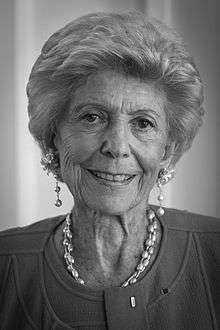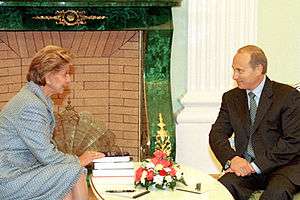Hélène Carrère d'Encausse
| Hélène Carrère d'Encausse | |
|---|---|
 | |
| Born |
Hélène Zourabichvili 6 July 1929 Paris, France |
| Occupation | Historian |
| Known for | Member of the Académie française |
| Spouse(s) | Louis Carrère (m. 1952) |
| Children | 3 |

Hélène Carrère d'Encausse (born 6 July 1929 in Paris as Hélène Zourabichvili) is the permanent secretary of the Académie française and a historian specializing in Russian history. She was a recipient of Lomonosov Gold Medal in 2008.
Carrère d'Encausse is a graduate of the elite Institut d'Études Politiques de Paris (Sciences Po).
She was elected to seat 14 of the Académie française in 1990, and her academician's sword was made by the sculptor Goudji. She became permanent secretary on 21 October 1999.
In her book L'Empire éclaté published in 1978 she predicted the dissolution of the Soviet Union.
Her son, Emmanuel Carrère (born 1957), is an author, screenwriter and director.
She was awarded Grand Cross with Star of the Order of Merit of the Republic of Poland (2011).[1]
Views on French social issues
Hélène Carrère d'Encausse, considered one of the most eminent historians of France, joined other French politicians in identifying polygamy as one of the causes of the 2005 civil unrest in France in a November 2005 interview given to Russian television channel NTV:
Why can't their parents buy an apartment? It's clear why. Many of these Africans, I tell you, are polygamous. In an apartment, there are three or four wives and 25 children.[2]
These and similar remarks by others, including Nicolas Sarkozy and Bernard Accoyer, were disputed by the antiracist group MRAP, which blamed the unrest on French racism.[3]
In another context, she remarked: "It's true that the Russian television follows Putin step by step. But French television is so politically correct it is a nightmare. We have laws Stalin could have thought up. . . People cannot express an opinion about ethnic groups, the Second World War, and plenty of other things. You’ll be quickly convicted of a crime."[4]
Bibliography
- 1963 Réforme et révolution chez les musulmans de l'Empire russe (Armand Colin)
- 1966 Le Marxisme et l'Asie (avec Stuart R. Schram), 1853-1964 (Armand Colin)
- 1967 Central Asia, a century of Russian rule, Columbia Univ., réédition 1990 (Duke Univ. publication)
- 1969 L'URSS et la Chine devant la révolution des sociétés pré-industrielles (avec Stuart R. Schram) (Armand Colin)
- 1972 L'Union soviétique de Lénine à Staline (Éd. Richelieu)
- 1975 La Politique soviétique au Moyen-Orient, 1955-1975 (Presses de la F.N.S.P.)
- 1978 L'Empire éclaté (Flammarion)
- 1979 Lénine, la Révolution et le Pouvoir (Flammarion)
- 1979 Staline, l'ordre par la terreur (Flammarion)
- 1980 Le Pouvoir confisqué (Flammarion)
- 1982 Le Grand Frère (Flammarion)
- 1985 La déstalinisation commence (Complexe)
- 1986 Ni paix ni guerre (Flammarion)
- 1987 Le Grand Défi (Flammarion)
- 1988 Le Malheur russe (Fayard)
- 1990 La Gloire des Nations (Fayard)
- 1992 Victorieuse Russie (Fayard)
- 1993 L'URSS, de la Révolution à la mort de Staline (Le Seuil)
- 1996 Nicolas II, La transition interrompue (Fayard)
- 1998 Lénine (Fayard)
- 2000 La Russie inachevée (Fayard)
- 2002 Catherine II (Fayard)
- 2003 L'Impératrice et l'abbé : un duel littéraire inédit (Fayard)
- 2005 L'Empire d'Eurasie (Fayard)
Honours
-
 Monaco : Commander of the Order of Cultural Merit (November 1999)[5]
Monaco : Commander of the Order of Cultural Merit (November 1999)[5]
References
- ↑ Postanowienie Prezydenta Rzeczypospolitej Polskiej dnia 31 sierpnia 2011 r. (M.P. Nr 108, poz. 1090)
- ↑ Sciolino, Elaine (18 November 2005). "Immigrant Polygamy Is a Factor in French Unrest, a Gaullist Says". New York Times. Retrieved 17 September 2014.
- ↑ Sciolino, Elaine (18 November 2005). "Immigrant Polygamy Is a Factor in French Unrest, a Gaullist Says". New York Times. Retrieved 17 September 2014.
- ↑ Taylor, Jared (28 November 2005). "Worse than the riots themselves?". http://www.amren.com/. Retrieved 17 September 2014. External link in
|publisher=(help) - ↑ Sovereign Ordonnance n° 14.274 of 18 Nov. 1999 : promotions or nominations
External links
- (French) Home page at the Académie française